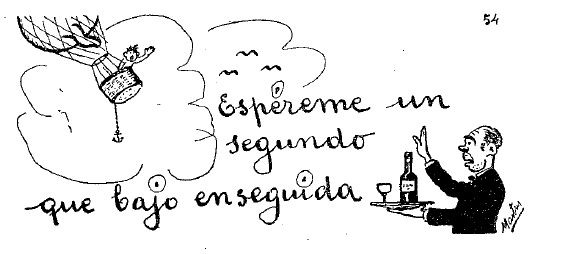
| Языки :: Испанский |
| Аудио |

 |
|
 |
|
155 |
Español |
Spanish |
|
Lección Cincuenta y cuatro (54) |
||
| La criada nueva (1) | The new maid. | |
| 1 | (Están en escena, al levantarse el telón, Emilia y Dolores, criadas jóvenes.) | [Are] on the stage, at the rising (of) the curtain, Emily and Dolores, young maids. |
| 2 |
Dol. — Desde mañana (2) hará usted este salón y esta galería. Em. — Muy bien. |
D. — From to-morrow you will do this sitting-room and this gallery. — Em. — Very well. |
| 3 |
Dol. — A las diez tiene que estar lista toda esta parte
(3). E. — Perfectamente. |
D. — At ten o'clock all that part must [has to] be done. — E. — Perfectly. (1) |
| 4 |
D. Le recomiendo que limpie el polvo con sumo esmero, sobre todo en los muebles donde haya algún retrato de don Jorge (4). |
D. — I recommend you to [that you should] wipe the dust with extreme care, above all on [in] the pieces-of-furniture where there is (subjunctive) some portrait of don G. |
| 5 |
E. — ¿De quién ha dicho? D. (Señalando (5) un retrato sobre una mesa). De ese señor. |
E. — Of whom did you say? — D. (showing a portrait on a table). — Of that gentleman. |
| 6 |
E. — Ah, sí; ya he visto varios retratos de él en la casa. ¿Alguna persona de la familia? |
E. — Oh yes, I have already seen several portraits of him in the house. Some person of the family? |
| 7 |
D. — Un novio que tuvo (6) la señora hace treinta años. E. — Anda! ¿y todavía...? |
D. — A fiancé that my lady [the lady] had 30 years ago. — E. — Come, now ! and still...? |
| 8 |
D. — Sí, Es una historia como para una película. Como la familia se oponía, |
D. — Yes. It is a story as for a film. As the family was opposed |
| 9 |
porqué ella era inmensamente rica y él no tenia donde caerse
muerto... E. — Lo de siempre (7). |
because she was immensely rich and that he was stony-broke [had nowhere to fall
dead]... — E. — As always [that of always]. |
| 10 |
D. —- Él se marchó á América en busca de fortuna; ella quedó aquí aguardándole (8). E. — ¡Qué bonito! |
D. — He left for America in search of fortune; she remained here waiting (for) him. — E. — How lovely! |
| EJERCICIOS | EXERCISE : | |
| 1 | ¿Está usted listo? | Are you ready? |
| 2 | Espéreme (ou aguárdeme) un segundo, que bajo en seguida, | Wait (for) me one second, [that] I descend at once. |
| 3 | ¡Lo de siempre! : llegaremos tarde (or : retrasados) por culpa de usted. |
As always we shall arrive late by your fault. |
| 4 |
No se enfade (usted); tornaremos un taxi, y llegaremos a tiempo; |
Don't get angry; we shall take a taxi and arrive in time; |
| 5 | además, ya sabe usted que el primer acto es aburrido. | moreover, you know well [already] that the first act is dull. |
| 6 | Sea lo que sea, me gusta ocupar mi asiento | Whether it be so or not [be what it be], I like to occupy my seat |
| 7 | antes de levantarse el telón, para no molestar a nadie. | before the rising of the curtain, to disturb nobody [for not disturbing at n.]. |
| NOTES. | |
| 1 | After a scene of El Alfiler, The Pin, an amusing play by Muñoz Seca. |
| 2 |
Yo haré, usted hará, I shall do, you will do. Yo hago, usted hace, I do, you do. |
| 3 |
I am ready : Estoy listo, and not soy (fortuitous
state, not an inherent quality); on the other hand, listo also means skilful, so that : Soy listo means I am skilful (quality). |
| 4 |
Le recomiendo, le means to him, to her (a usted).
— Limpiar, to clean; yo limpio, usted limpia, I clean, you clean, — Esmero, care, attention; cocina esmerada, first-rate cooking; servicio esmerado, perfect attendance. — Sumo, extreme (cf. summum). — Jorge (pron. HorHay). |
| 5 | Señalando or indicando. |
| 6 |
Tener, to have, possess; yo tengo, usted tiene, I have, you have; yo tenía, usted tenía, I was having, you were having; yo tuve, usted tuvo, I had, you had; yo tendré, usted tendrá - I shall have, you will have; yo tendría, usted tendría, I should have, you would have. |
| 7 |
Caerse, to "fall oneself"; me he caído, I have fallen; se ha caído, he has fallen. — Lo de siempre (lo, neuter), that, the thing of always, what always happens. |
| 8 |
Aguardar (gwar), to wait (for); esperar, to hope and also to wait. |
|
The seat, place engaged : el asiento. — There is room : Hay sitio. — There are two seats : hay dos asientos. — Enfadarse : to get angry. — ¿Está usted enfadado? — No me enfado nunca : Are you angry? — I never get angry. — Se ha enfadado : he has got angry. Está enfadado : he is angry. |
